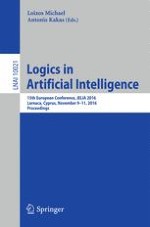This book constitutes the proceedings of the 15th European Conference on Logics in Artificial Intelligence, JELIA 2016, held in Larnaca, Cyprus, in November 2015. The 32 full papers and 10 short papers included in this volume were carefully reviewed and selected from 88 submissions. The accepted papers span a number of areas within Logics in AI, including: belief revision, answer set programming, argumentation, probabilistic reasoning, handling inconsistencies, temporal logics and planning, description logics, and decidability and complexity results.
